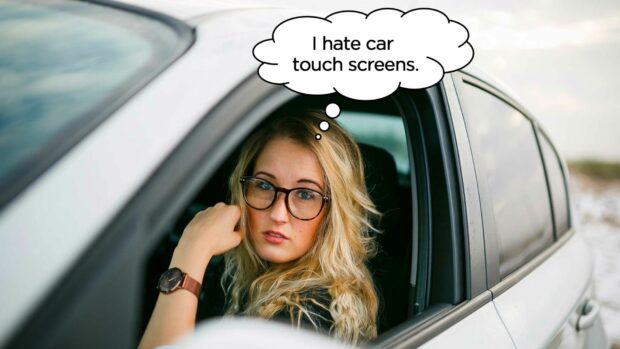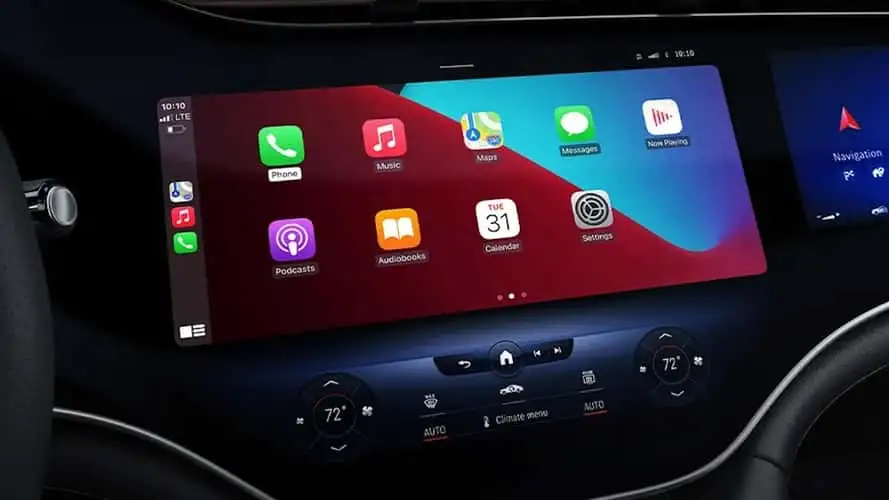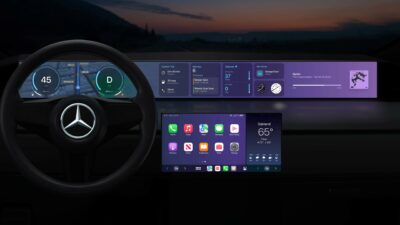TL;DR:
- Mercedes-Benz won’t use Apple’s next-gen CarPlay that takes over vehicle screens
- Mercedes wants an integrated experience, controlled by its new MB.OS system
- Automakers risk becoming hardware suppliers for tech giants if they cede control
- This Mercedes-Benz CarPlay rejection creates an opportunity for a Mercedes-led software partnership with Google for next-gen navigation
- Car companies need to prove they can build better software than Apple/Google to woo future customers
Imagine sliding into your sleek new Mercedes-Benz, only to find that every screen – from the instrument cluster to the passenger display – has been taken over by Apple CarPlay. Not just the center screen like with the current version of CarPlay, but all screens in your car. For some automakers like Porsche and Aston Martin, that future is coming soon with Apple‘s next-generation CarPlay interface. But Mercedes is saying “thanks, but no thanks.”
Why would Mercedes reject a chance to integrate with the wildly popular iPhone ecosystem? In a recent interview, Mercedes CEO Ola Källenius laid out a compelling case for why handing over the keys to Apple is not in the cards for his company.
It’s All About That Holistic Experience
Källenius argues that to create a truly fantastic automotive customer experience, Mercedes needs to control every aspect of the software environment. He envisions the upcoming MB.OS operating system as the “central nervous system” of Mercedes vehicles. It won’t just handle your Spotify playlist, but will also manage automated driving features, the EV powertrain, and basic car functions.
“If you want that to be perfect, integrated, and seamless, you don’t want to jump between different worlds,” Källenius said. Relying on a patchwork of outside software means a disjointed experience for drivers. Even with the current CarPlay, users have to bounce back and forth between Apple’s interface and Mercedes’ proprietary system.
More Than Just a Pretty Interface

Slick graphics and a familiar Apple iOS-style interface make CarPlay appealing. But under the hood, the stakes are much higher for automakers. Handing the reins to Apple could mean giving up troves of valuable data, lucrative revenue streams from subscription services, and the ability to differentiate from competitors.
Källenius worries that if tech companies get their way, Mercedes could be reduced to a mere hardware supplier – simply installing screens and speakers while Apple or Google run the show. For a brand built on luxury, performance and cutting-edge innovation, that’s not an appealing proposition.
A Friendlier Relationship With Google
This Mercedes-Benz CarPlay rejection for Apple doesn’t mean that Mercedes is going it alone on the software front. The company is partnering with Google to create next-generation Android Auto navigation and mapping features optimized for the car. But unlike with Apple, Källenius said Mercedes’ own engineering team is deeply involved to ensure an integrated experience with Google.
Mercedes wants “the best of both worlds” – tapping Google’s expertise in areas like machine learning, while maintaining control over how that tech is implemented in the vehicle.
The Luxury of Choice

To be clear, Mercedes isn’t ripping CarPlay out of its vehicles entirely. Drivers will still be able to use the current smartphone projection version if they please. But they won’t be forced into a completely Apple-dominated cockpit.
Källenius recognizes that some drivers may prefer their familiar phone interface. But he’s betting that most will come to appreciate the benefits of the Mercedes MB.OS operating system that’s purpose-built and deeply integrated into the vehicle.
The Road Ahead for Automakers
This Mercedes-Benz CarPlay rejection is just the latest blow to Apple. Other automakers are wrestling with how to respond to Silicon Valley’s encroachment into the auto industry. GM is going a step further, dumping CarPlay altogether in future EVs. Ford recently introduced its own Android-based operating system.
But to truly beat the tech giants, car companies will have to build software that’s more compelling and user-friendly than what Apple and Google offer. With MB.OS, the Mercedes operating system, Källenius is confident Mercedes can pull it off.
We are intrigued, but not entirely convinced. What about you? As car buyers grow accustomed to the polish and familiarity of CarPlay, anything less may be a tough sell – no matter how well it integrates with a car. Plus, studies have shown that drivers HATE car touchscreens. Dangerous car touchscreens are one of the reasons why our car insurance rates are so high. Expecting drivers to fumble around with different interfaces is frustrating, distracting, and dangerous.
Still, you have to respect Mercedes for staking out its own path. In a world where iPhones have already taken over our pockets, perhaps we don’t need them conquering our cars as well. Especially when you’ve paid handsomely for the three-pointed star on the hood.
Mercedes Pumps the Brakes on Apple’s Next-Gen CarPlay Ambitions Share on X
Frank Wilson is a retired teacher with over 30 years of combined experience in the education, small business technology, and real estate business. He now blogs as a hobby and spends most days tinkering with old computers. Wilson is passionate about tech, enjoys fishing, and loves drinking beer.












 13 Summer Music Festival Essentials to Pack Before Hitting the Road
13 Summer Music Festival Essentials to Pack Before Hitting the Road
Leave a Reply
You must be logged in to post a comment.